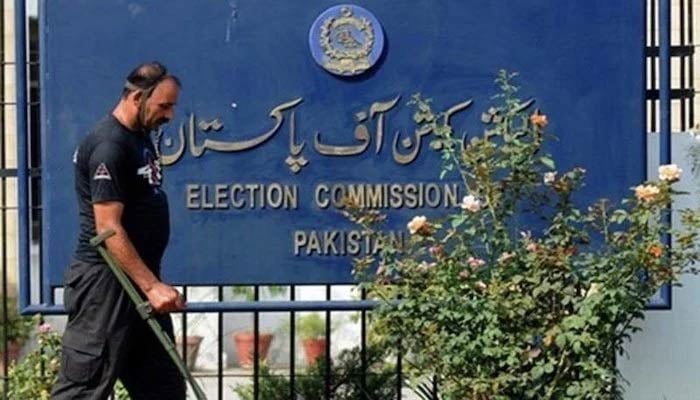Non-bailable arrest warrants for Imran, Fawad issued in ECP contempt case
ECP issues warrants over PTI chairman and former party leader's failure to appear before it
ISLAMABAD: The Election Commission of Pakistan (ECP) on Tuesday issued non-bailable arrest warrants for Pakistan Tehreek-e-Insaf (PTI) Chairman Imran Khan and ex-party leader Fawad Chaudhry in the case pertaining to "contemptuous" remarks against Chief Election Commissioner Sikandar Sultan Raja.
Former prime minister Khan, who was ousted via a no-confidence vote last year, his former close aide Fawad and PTI's former secretary general Asad Umar are facing charges of contempt, for issuing statements against the electoral body and the Chief Election Commissioner (CEC) Sikandar Sultan Raja.
The four-member bench of the ECP issued the warrants as the ex-prime minister and his former close aide did not appear at the hearing despite being summoned multiple times.
Umar also failed to appear before the bench; however, the ECP did not issue his arrest warrant on his lawyer's request, who contended that Umar usually does not skip the proceedings.
During the hearing, Umar's lawyer Umaima Mansoor maintained that Umar skipped the last hearing only.
She informed the bench that Fawad did not appear because he is currently in Lahore, while his lawyer Faisal Chaudhry was appearing before a high court.
At this, ECP member Nisar Durrani ordered the lawyer to file a plea seeking exemption from the hearing for Umar.
The bench said that non-bailable arrest warrants of the remaining two suspects were being issued as only framing of charges was left in the case.
The case
Last year, the top electoral body initiated contempt proceedings against the PTI leaders and the former senior vice president for allegedly using foul language against the CEC. It had served several notices on them, asking them to appear in person and explain their point of view.
However, the PTI leaders did not appear before the ECP and later challenged its powers to initiate contempt proceedings under Section 10 of the Election Act 2017 in different high courts.
Section 10 of the election act states that the “election commission may exercise the same power as the high court to punish any person for contempt of court and the Contempt of Court Ordinance, 2003 (V of 2003), or any other law pertaining to contempt of court shall have effect accordingly[…]”
Earlier this year, the ECP filed a petition with the Supreme Court, seeking consolidation of all six petitions before one high court.
In its decision, the top court said the ECP had been allowed to continue proceedings under Section 10 against the PTI leaders, but it barred the electoral body from giving final orders.
-
Security forces gun down 30 terrorists in multiple IBOs in KP: ISPR
-
MQM-P calls for new province in Sindh
-
US report validates Pakistan military edge over India: PM
-
Banned TTP poses serious threat to Pakistan security: UNSC panel
-
CM Afridi clarifies remarks on by-poll after ECP requests army deployment
-
Dubai sees 3.2m Pakistani passengers in 2025 as airport sets new milestone
-
Security forces kill 23 Indian proxy terrorists in KP's Kurram
-
Pakistan to construct island to boost oil exploration: report












